Some of the previous dispatches from Africa have included no small amount of economic, social, or political commentary, but since Ghana is in a much crazier state than Namibia, I make no judgements. I am after all, merely a 26 year old traveling writer who never went to school. And so throughout all of this there’s been a major “what the heck do I know” sense to my train of thought since arriving here in Accra. Accra is much more of what I think many of my friends, family, and readers might imagine when they think of a big African city. The Namibian capital of Windhoek could be a mere suburb of Greater Accra, a city wracked with traffic, whose roads are littered in potholes and coated in fine dry sand and dust that billows up into the air – there mixing with the brake dust and exhaust fumes from bumper to bumper traffic that’s almost eternally stuck in 2nd gear and consists of 50% old passenger vans that would be condemned in the U.S. From here this 2/3 asthmatic concoction collects the black smoke from garbage fires, thereby reaching its final form before hanging low over the city like 1900’s Birmingham. It’s my fault a little bit for coming here in the dry season when the dust is worse and there’s no rain to wash anything clean including the air.
There could not be a greater variation between the Africa of my arrival and the Africa of my current situation. I’d wager one could fit 4 Ghanaian landmasses into the landmass of Namibia, even though Namibia holds 15X fewer residents. The cultural characteristics change too with that much space. For the Namibian, time and space have different meanings, wildness is appreciated, as I saw firsthand when I picked up three tween-aged Namibian hitchhikers who were visiting a game park just for the sake of spotting animals and having some peace and quiet. When I asked how they as Africans react when they see their native wildlife, a giraffe for instance, the three put aside their click-language and explained in perfectly eloquent English that seeing the animals of their land versus seeing a bear at a zoo brings about a certain “Ah…” a sound carrying a timbre which I fancied indicated a sort of quiet reverence. The Ghanaian on the other hand – in particular the Accra resident, lives in a concrete jungle. Not to say that Accra looks like Manhattan, but rather every building is made entirely of concrete, while the precious little shreds of greenery that aren’t wilted or chopped away are in fact the long desecrated descendants of tropical rainforest. A concrete jungle indeed.
A tropical culture through and through, Ghanaians like spicy food and sweet fruit, speaking very loudly to each other, and playing rhythmic music long into the AM. Americans are fans of discussing culture shock when they travel. I think it’s important first to measure exactly what feels like home about your cultural kaleidyscope that then becomes distorted when looking at the world through another. I find that cultural shocks for me tend to impact with the greatest fury the more the sense of conservative British modesty which I certainly and naturally ascribe to is absent within a society. Ghana, or the Gold Coast as it was named by the British, was the first country where a black man was shackled and sent across the Atlantic, and so I felt it both natural and appropriate that I should feel out of place with my modesty. It’s interesting because not all Americans associate their Americanness with modesty, that’s just one of the ways in which I found my patriotism.
Here in Ghana I am staying with some family members of friends to my own family, and they’ve been darling to me. The morning after I landed, Christmas was upon the world – my first time experiencing the big day outside of my childhood home in the wooded hills of Jake Jackson, 45 minutes south of Washington D.C. My hosts Kwadwo and Barbara dressed in their Christmas finery – African prints of green, black, and purple… Seeing I was in need of my own festive raiment, Kwadwo offered me one of his own shirts – a short-sleeved affair of orange with red circles. Afterwards he told me that he would contact his wife’s older sister who would take me to market to buy prints for my own African shirts – that way I would fit in and be able to go out with them. The idea of having tailored, colorful, African prints to wear to soirees has been a long-held dream of mine, one upon which the longer I pondered the older and older I realized it was. Climbing into his Toyota I got to experience firsthand the agony of Accra holiday traffic on the way to church, some of the accompanied burdens are listed above. The African Christmas church service was as colorful as a Pollock painting, with everyone wearing different patterns and colors of every conceivable grandeur and rarity. The service was long, but fun, with dancing, singing, and a live band. Parts of the sermon, though I am not Christian, were powerful and had affect which reached even the agnostic – even the atheist.
After it was over, my day shifted to become one of those situations one finds oneself in upon only the most foreign of occasions. In these kinds of moments it’s hard not to almost feel like a spectator of one’s own self, separated and gently trailing behind. We drove through smog-y Accra and suddenly entered a gated community of extraordinary decadence adjacent to the principal Accra Ghanaian Air Force base. The silky tarmac turned right and then left, passing walled orange villas with Mediterranean-tiled roofs before parking just in front of the gate to a house through which walked finely dressed, and on average more seasoned Ghanaians still in their Christmas outfits. The whole setting looked like the opening scene of Connie Corleone’s wedding in The Godfather. Inside, I met some aristocratic gentlemen who noted and spoke with pleasure on my foreignness and earlier observed attempts to sing “Twi” hymns at church, Twi being one of the three principal Ghanaian languages. After the wives rejoined these gentlemen, we entered the villa and were led by cammariere to the backyard where a shaded pavilion sported a gathering of tables. Sitting down to a fine dining experience, I began to feel so completely and utterly out of my depth that it actually became easier to go the other way and embrace my foreignness and the foreignness of my situation before capably resigning myself to being nothing more nor nothing less than an exotic; a curiosity to be prodded on occasion for humor’s sake before returning to one’s conversation. Among the most frequent prodders was a gentleman I’ve only come to know as “Major,” stemming from his attained rank in the air force. Here was a fellow who wanted to talk with me, as well as the only soldier to share in the Uisce Beatha of the grape. Occasionally our table was honored by a visit from the ever-circling aristocrat whose wealth afforded us all the opportunity to dine and relax in the 90 degree Christmas weather. This man was the owner of a prominent Ghanaian/American oil company, and in asking where I was from, revealed both the extent of his wealth and likely his principal hobby when not at work at the oil firm.
“Where are you from young man?” he asked me. “The United States,” I responded.
“And?”
“Washington D.C.”
“And?”
“Falls Church?”
“Ah, good. I own property in Herndon”.
“Then we’re practically neighbors,” I said laughing. What do you readers think, lobbyist?
Lunch consisted of classic Ghanaian dishes that I’m certain have a nostalgic importance to those gathered who could have certainly afforded to eat more appetizing dishes. Chicken neck, mashed cassava and rice, pork feet, fish with all the bones and skin attached, all eaten on a plate with one’s hands, is not exactly choice cuisine in my mind especially considering how everyone was dressed so finely. There are better parts of the pig, fish, and chicken, parts that don’t require the constant removal of bones and other indigestibles, but I can only assume that because these are the dishes that poor Ghanaians grew up eating on the street, they maintain their special place in the cuisine of the rich.
Safe to say this was a Christmas I would never forget, not least of all because the buildup of sweat by the time we finally returned to Kwadwo’s house, on the 25th of December, was astonishing and something I don’t want to repeat any Christmas to come. Maybe it’s my British modesty, but Christmas should be cold.
Make a donation so Andy can continue telling his stories!
Continue exploring this topic — The Year of Return – African Americans and Africa – Andy’s Back in the Jungle
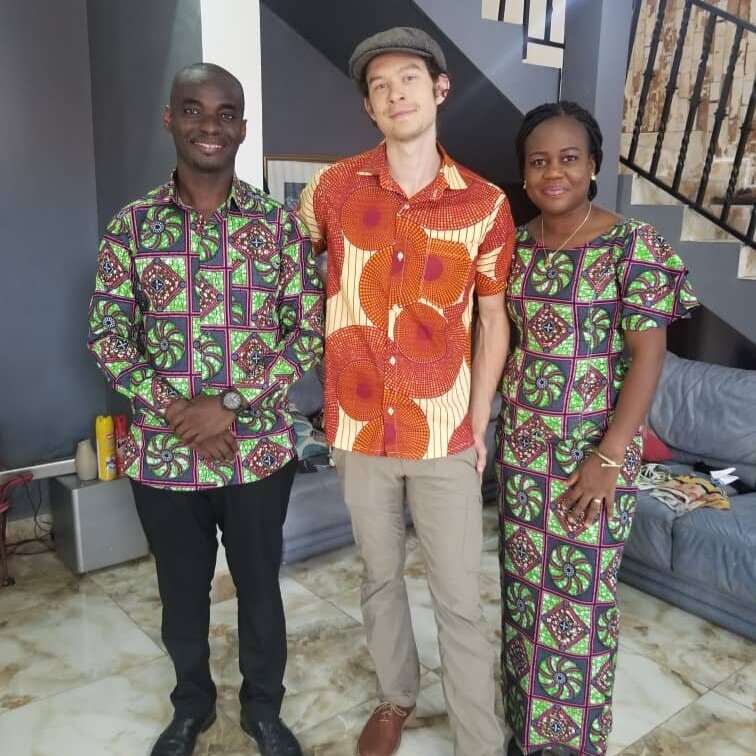
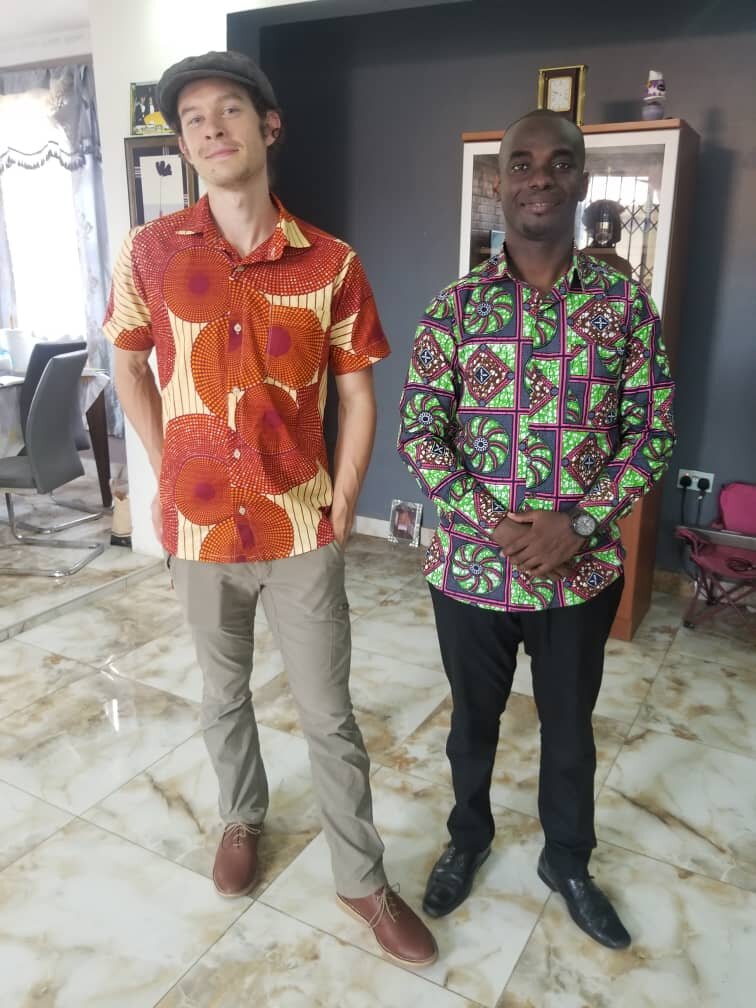
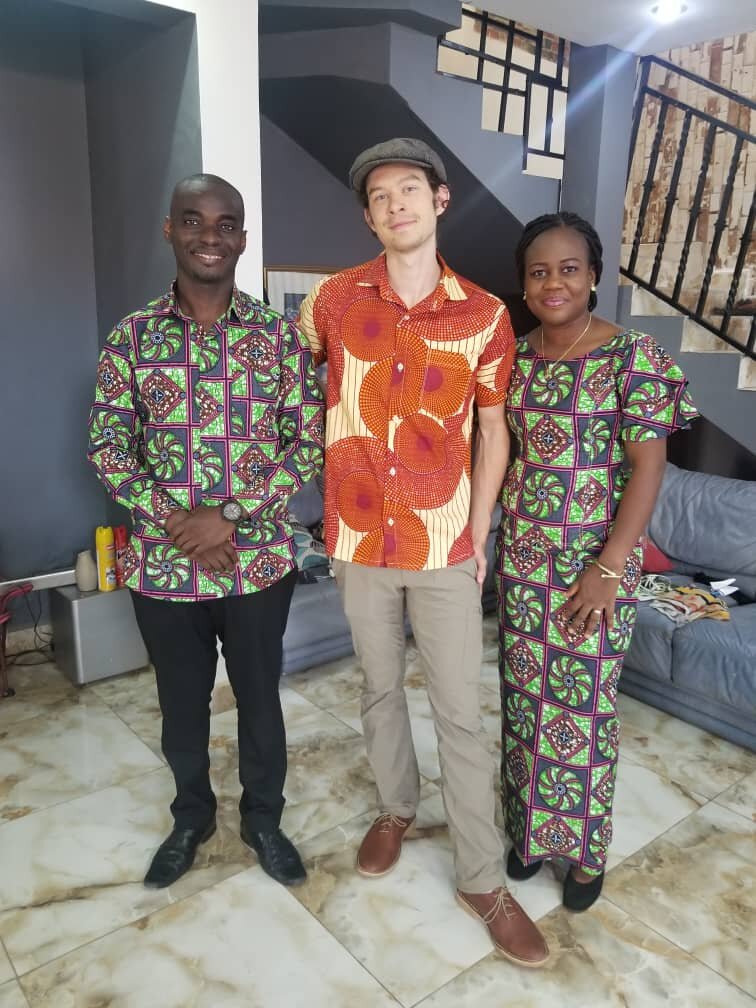
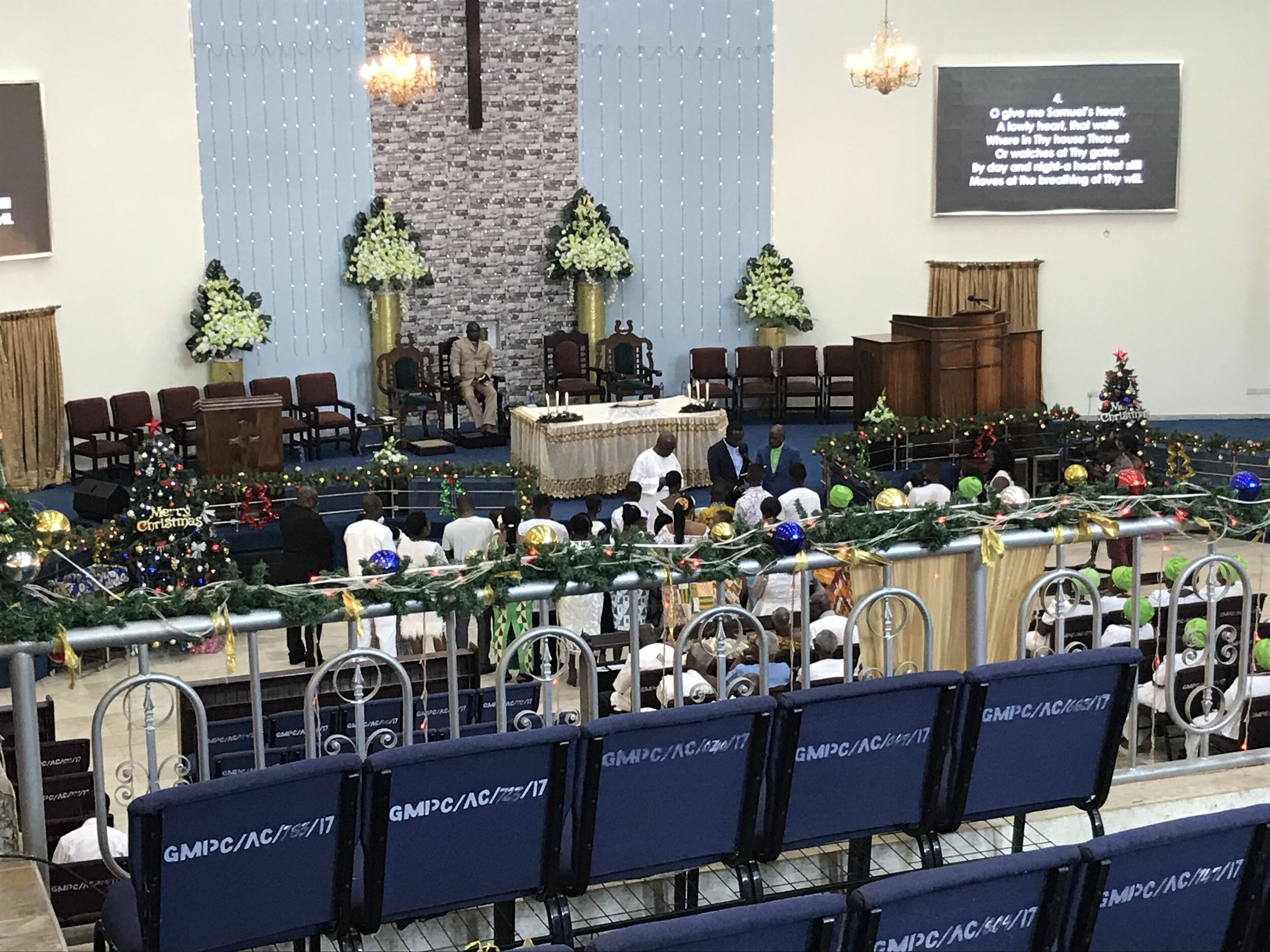
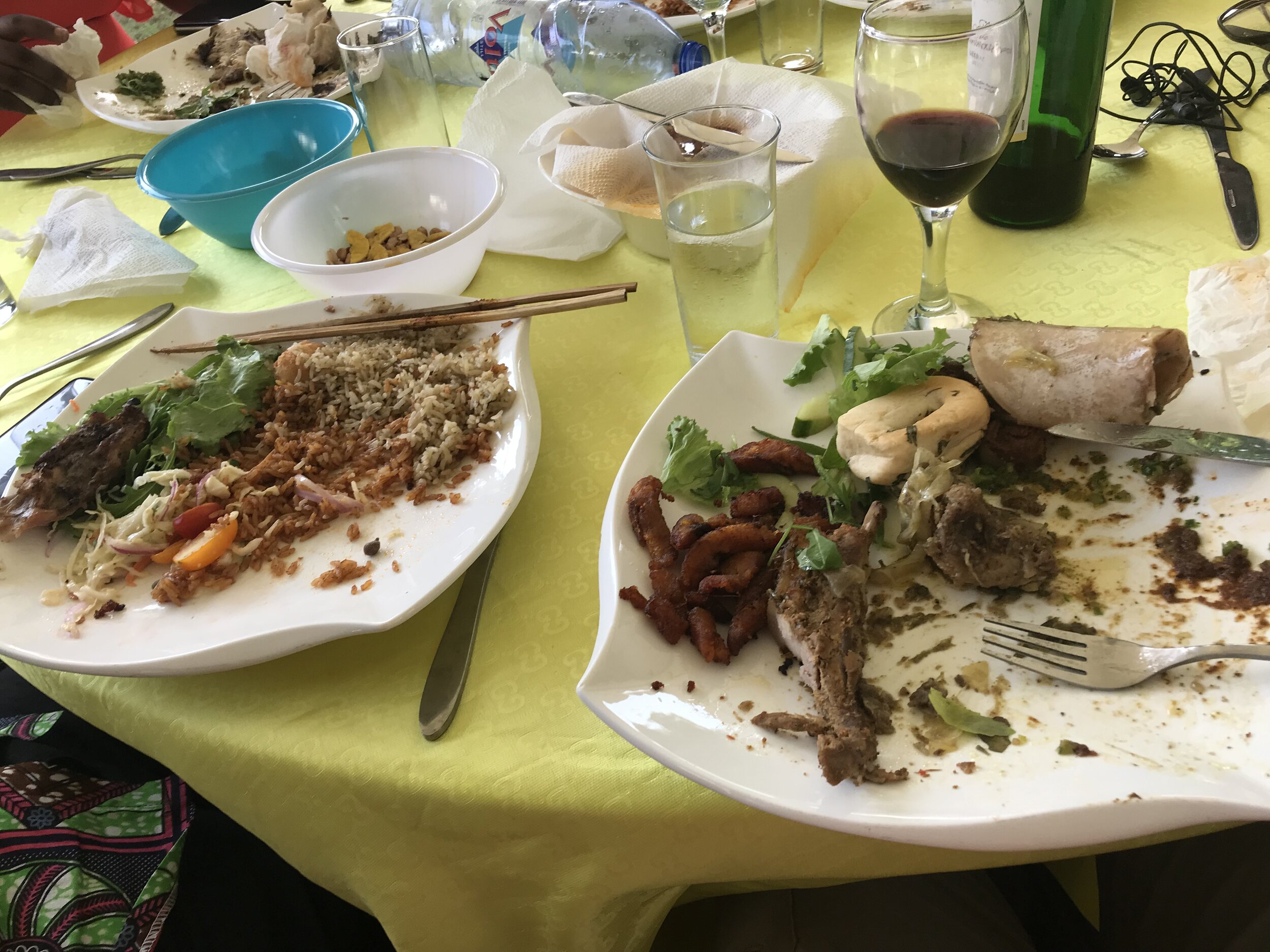



Hahahaha! In my early 20’s, I experienced the polar antonym of your reaction to a “good Christmas sweat”. On a tropical Australian beach that Xmas day, I thought, “you mean you don’t HAVE to do winter??” And so for 25 years I wore shorts on Christmas in what to me are more hospitable climes. Imagine, if we all craved the same climate & surroundings, that spot would be pretty dang crowded!
My take is that you have an unusual feeling about urban life for your age. For centuries, “how ya gonna keep em down on the farm, after they’ve seen Paris” has been the catchphrase for youths seeking the constant stimulus (and opportunities) afforded by city life. I, myself, was the same. Now, with ample streaks of grey in my thinning mane, I crave quiet and yes, a life closer to nature. In my current, temporary, suburban domicile, I giggle with delight at the site of fox, raccoons, hawks & owls. My neighbors often shriek in terror (RABIES!! ?). We all navigate through our lives with a chart of our design. (BTW, DC traffic has to rate among the worst on the planet and this xmas was no exception).
Cheers to you! Soak it all in. Take delight also in the fact that in the decades to come, you will re-read these thoughts from your youth and appreciate the ever-changing nature of our perceptions.
Nice read, but Andy, keep in mind culture! Ghanaians don’t like fish fillet, when we’re eating fish, we have the whole fish spiced up and grilled, we eat and leave the bones, it is not a sign of poverty! It is a delicacy. The dust you met is called harmattan brought by North West monsoon winds, blowing over the African desert and generating dust that spread over western Africa, even to South America.
Hello Andy, its a nice piece you put here. Can I repost this in my website?
adamsazutheophilus77@gmail.com
Will be happy to know if am allowed.